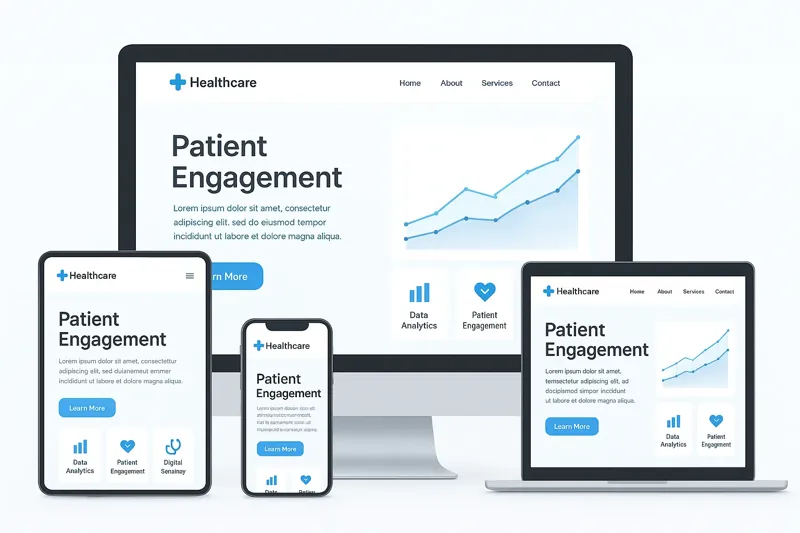The Critical Role of SEO in Healthcare Marketing
Importance of SEO for healthcare providers
SEO is indispensable in healthcare marketing because it significantly enhances a provider’s online visibility at the point where patients begin their healthcare journey. With over 77% of patients initiating their healthcare searches through search engines, a robust SEO strategy ensures that medical practices appear prominently in search results, driving more patient traffic and increasing practice growth.
Patient behavior in online healthcare searches
Patients actively seek healthcare services online, with 87% of them booking appointments after finding a healthcare provider via search engines. Most of these searches are conducted on mobile devices, accounting for 63% of queries, making mobile-optimized websites essential to meet patient expectations for fast, seamless access. Moreover, local SEO is critical as the Google Local 3-Pack captures 44% of clicks in local healthcare searches, guiding patients to providers nearby.
Impact of SEO on patient acquisition
An effective SEO approach not only elevates website rankings but also builds patient trust by highlighting credible, authoritative content and accumulating positive, HIPAA-compliant patient reviews. Listings with more than 10 reviews generate twice as many inquiries, directly boosting appointment requests. Overall, SEO delivers a cost-effective, sustainable patient acquisition channel by targeting high-intent search terms, improving visibility with both organic search and local SEO tactics, ultimately driving measurable increases in new patient numbers.
Understanding Patient Search Behavior and SEO Basics

Why is SEO crucial for healthcare providers?
Patients initiate over 77% of their healthcare journeys through search engines, making SEO for Doctors 2025 an indispensable strategy for medical practices seeking to increase online visibility and attract new patients.
The role of organic search in healthcare
Organic search results receive five times more clicks than paid advertisements in the healthcare sector, highlighting the importance of optimizing websites and content to rank naturally.
This patient-driven discovery through organic search enhances trust, provides valuable information, and fosters stronger connections between patients and providers. Learn more about the Impact of online reviews, Organic vs paid search clicks, and Patient appointment booking online to understand this effect.
Why SEO outperforms paid ads in healthcare
SEO offers a cost-effective, sustainable approach compared to paid ads.
It enables healthcare providers to maintain continuous visibility without ongoing advertising spend, supporting long-term patient acquisition goals.
By prioritizing SEO, healthcare organizations tap into the predominant patient behavior of initiating care via search engines and secure a higher click-through rate, positioning themselves strategically in a competitive digital landscape. For comprehensive insights, see SEO for Healthcare Providers, Healthcare SEO strategies, and learn about the E-E-A-T principles—Experience, Expertise, Authority, and Trustworthiness.
Local SEO: Dominating Your Community’s Competitive Landscape

How does local SEO influence healthcare patient inquiries?
Local SEO plays a pivotal role in driving patient inquiries for healthcare providers. Google's Local 3-Pack significance which appears prominently in search results, captures 44% of clicks in local healthcare searches. This highlights the critical need for practices to optimize their local presence.
Listings that feature over 10 patient reviews can generate twice as many inquiries, emphasizing the value of actively managing patient feedback, including collecting HIPAA-compliant reviews.
Google’s Local 3-Pack significance
The Local 3-Pack is the prime real estate for local search results, instantly boosting visibility and credibility. Appearing in this pack means your practice is one of the first options patients see when searching for healthcare nearby, increasing the likelihood of patient appointment booking online and patient engagement.
Optimizing Google Business Profile (GBP)
Optimizing your Google Business Profile is fundamental to capturing local search traffic. Ensuring your practice’s profile includes accurate and consistent NAP consistency importance (Name, Address, and Phone number) information, detailed descriptions of services, and regularly updated patient reviews enhances your ranking.
Incorporating healthcare SEO compliance with HIPAA review collection systems ensures trust and adherence to regulatory standards.
Importance of NAP consistency
Consistent NAP details across all online directories and platforms are critical. Inaccurate or inconsistent information can confuse search engines and reduce your chances of appearing in local packs, directly impacting patient acquisition as emphasized in the SEO for Doctors 2025 guide.
Patient reviews and their SEO impact
Patient reviews directly influence local SEO by enhancing trustworthiness and authority. Active management of reviews, encouraging positive feedback, and timely responses improve your practice’s reputation and search ranking, attracting more local patients, as detailed in Impact of online reviews.
| Topic | Strategy | Benefit |
|---|---|---|
| Google's Local 3-Pack significance | Aim for inclusion with local SEO | Captures 44% of clicks in local searches |
| Google Business Profile (GBP) optimization | Complete profile, update reviews | Increases visibility and trust |
| NAP Consistency importance | Maintain uniform contact info | Ensures higher local ranking |
| Patient Reviews including HIPAA-compliant review collection | Gather 10+ compliant reviews | Doubles patient inquiries |
Keyword Research Focused on Intent and Local Relevance
What keyword strategies best suit healthcare SEO?
In healthcare SEO, keyword research for healthcare SEO must be strategic and patient-focused. Prioritizing user intent ensures that the keywords align with what prospective patients are searching for, such as symptom-based queries or specific treatment services. Incorporating local SEO nuances in healthcare enhances visibility among nearby patients actively seeking care.
Targeting long-tail keywords and location-specific phrases—for example, "pediatric dermatologist in New York"—helps attract high-intent patients with specific needs. These keywords tend to have lower competition and higher conversion potential.
It is vital to avoid keyword stuffing, which can degrade content quality and negatively affect search rankings. Instead, keywords should be integrated naturally into on-page SEO best practices, such as page titles, headers, meta descriptions, and body content.
Healthcare marketers and practitioners can leverage tools like Google Keyword Planner, SEMrush, and Yoast SEO. These tools facilitate comprehensive keyword discovery, competitor analysis, and on-page optimization tailored to the regulated healthcare environment. Effectively applying these strategies supports enhanced healthcare SEO strategies for improving online visibility, improved local search rankings, and patient growth through healthcare content marketing.
Creating Patient-Focused, Authoritative Content to Boost SEO
How does content impact healthcare SEO effectiveness?
Content plays a pivotal role in healthcare SEO by enhancing both search engine rankings and patient trust. High-quality, patient-focused content that embodies Google's E-E-A-T principles—Experience, Expertise, Authority, and Trustworthiness is essential. This kind of content signals to search engines that the website is a credible and reliable source, which improves organic visibility.
Importance of E-E-A-T in healthcare SEO
In the healthcare industry, where information can directly affect patient well-being, demonstrating E-E-A-T is non-negotiable. Content must be medically accurate, clear, and reviewed or authored by certified professionals. Providing detailed author credentials and citing reputable sources such as CDC or NIH reinforces authority and trustworthiness.
Content types: blogs, FAQs, videos, and podcasts
Diverse content formats engage users effectively at various stages of the patient journey:
- Blogs address patient questions and explain treatments in a conversational, accessible manner, supporting patient-focused blogging.
- FAQs offer concise answers to common concerns, improving site usability and targeting specific search queries.
- Videos, especially educational and testimonial clips, increase engagement and help establish thought leadership in healthcare.
- Podcasts provide in-depth discussions on healthcare topics, further building brand authority.
Answer-based, human-centered content
Creating answer-based content focused on patient intent helps address specific needs, making the site more relevant and user-friendly. Human-centered writing emphasizes empathy and clarity, which fosters trust and encourages patient conversion.
Use of schema markup for enhanced visibility
Implementing schema markup such as MedicalClinic, LocalBusiness, and FAQ schemas enriches search results with structured data, enhancing click-through rates. These markups help search engines better understand the content context and improve local SEO performance, making listings more prominent in search results, including Google's Local 3-Pack significance.
Strategically combining authoritative, patient-focused content with schema markup is a proven approach to boost healthcare SEO, attract more qualified patients, and support sustainable practice growth.
Technical SEO Essentials for Healthcare Websites
What technical SEO elements are vital for healthcare websites?
Technical SEO is foundational for healthcare websites to ensure high visibility and superior patient engagement. Mobile-first design stands out as an essential factor, given that 63% of healthcare-related searches originate from mobile devices. A responsive, mobile-optimized healthcare website enhances user experience and significantly improves search engine rankings.
Website speed is another critical element. Faster-loading pages reduce bounce rates and meet Google's performance standards while maintaining patient trust. Equally important is the implementation of HTTPS security for healthcare sites, which protects sensitive patient data and builds credibility, aligning with stringent healthcare privacy regulations like healthcare SEO compliance with HIPAA.
Accessibility compliance is vital to ensure that all users, including those with disabilities, can navigate healthcare sites effectively. Adhering to accessibility standards such as WCAG in healthcare not only broadens reach but also contributes positively to SEO rankings.
A well-structured site architecture for healthcare websites supports seamless crawling and indexing by search engines. Logical navigation, clear URLs, and XML sitemaps submitted to platforms like Google Search Console enable effective search engine discovery and indexing of content. These elements collectively bolster SEO performance and patient acquisition efforts for healthcare providers.
Leveraging Patient Reviews and Reputation Management
How do patient reviews affect healthcare SEO and patient acquisition?
Patient reviews play a crucial role in healthcare SEO and patient acquisition. Listings with more than 10 reviews tend to generate twice as many patient inquiries, highlighting the significant influence of a strong online reputation. Reviews directly enhance local SEO by increasing a practice’s visibility in Google’s Local 3-Pack significance and other local search results.
Collecting HIPAA-compliant reviews
It is essential to collect patient reviews in a manner compliant with healthcare SEO compliance with HIPAA to protect patient privacy. Automated systems that ensure HIPAA-compliance facilitate the confident gathering of authentic reviews, which improves local search rankings and fosters patient trust without compromising confidentiality.
Impact of reviews on local SEO and patient trust
Positive patient reviews build credibility and trust, two critical factors for patient conversion. Reviews signal to search engines and prospective patients that the healthcare provider delivers quality care. Practicing active online reputation management by encouraging reviews and maintaining consistent listings with accurate NAP consistency importance details enhances local SEO outcomes.
Responding to reviews
Timely and professional responses to patient reviews demonstrate engagement and dedication to patient satisfaction. Responding, especially to negative or neutral reviews, can mitigate concerns and show commitment to quality improvement, further elevating patient trust and search rankings.
Review platforms like Google and Healthgrades
The most impactful review platforms include Google Business Profile optimization and Healthgrades. Optimizing Google Business Profiles with up-to-date information and encouraging patients to leave reviews there maximizes local search visibility. Healthgrades and other healthcare-specific platforms are equally important for attracting patients who research providers on these trusted medical review sites.
By integrating healthcare SEO compliance with HIPAA practices with proactive reputation management on prominent platforms, healthcare practices can significantly boost local SEO performance and patient acquisition.
Building Authority Through Backlinks and Partnerships
Why is backlinking important in healthcare SEO?
Backlinks are vital for healthcare SEO because they significantly enhance the authority and trustworthiness of a medical practice’s website. When reputable healthcare-related websites—such as medical associations, universities, and established health blogs—link to your site, search engines perceive your content as credible and authoritative. This increased trust translates to higher rankings in search engine results, making your practice more visible to potential patients. Learn more about Healthcare SEO strategies and Building backlinks for Medical Websites.
How do guest blogging and shareable content contribute?
Guest blogging on respected healthcare platforms and creating highly shareable content serve as effective methods for acquiring quality backlinks. These strategies not only provide direct links but also expand your online presence by tapping into established audiences. Shareable content, such as informative articles, infographics, or videos, encourages other sites to link naturally, amplifying your digital footprint. Discover effective Healthcare content marketing strategies and Guest blogging for medical SEO.
What role do collaborations with medical associations and news outlets play?
Collaborating with reputable organizations and news outlets in the healthcare sector further strengthens your website’s backlink profile. Such partnerships offer authoritative backlinks and signal to search engines that your site is a trusted source within the medical community. These collaborations also elevate your brand visibility and credibility among both peers and patients. Explore Healthcare backlink strategies and Medical SEO requirements.
How do backlinks improve search engine trust?
Backlinks act as endorsements of your website’s quality and relevance. The more backlinks you earn from authoritative sites, the more search engines trust your content, which directly influences your ranking in search results. This trust building is crucial in healthcare marketing where patients seek reliable and accurate information before making healthcare decisions. Read more on Building trust through healthcare SEO and SEO for Healthcare Practices.
| Strategy | Description | Benefit |
|---|---|---|
| Backlinks from reputable sites | Links from medical associations and universities | Boosts trust and authority Healthcare backlink strategies |
| Guest blogging | Creating content for other respected healthcare sites | Gains quality backlinks and new audiences Guest blogging for medical SEO |
| Shareable content | Engaging articles, videos, infographics | Encourages natural backlinks and shares Healthcare content marketing strategies |
| Collaborations | Partnerships with medical organizations and media | Enhances credibility and authoritative image Medical SEO requirements |
Content Marketing: Engaging Patients Across the Journey

How does content marketing support healthcare SEO and patient engagement?
Content marketing in healthcare plays a pivotal role in enhancing SEO and engaging patients strategically throughout their healthcare journey. Educational blogs that address common patient questions help improve organic search visibility by targeting relevant keywords and providing valuable information that patients actively seek (Healthcare content marketing, Content marketing for healthcare, Healthcare content marketing). Short videos, particularly those answering frequently asked questions, further engage audiences on platforms like YouTube and social media, fostering trust and enhancing brand recognition (Using video content in healthcare SEO, Healthcare videos, Healthcare content marketing.
Podcasts focusing on medical specialties establish providers as authorities within their field while reaching listeners who prefer audio content (Healthcare podcasting, Healthcare content marketing. These diverse content types attract a broad audience at various decision-making stages, from initial symptom research to treatment exploration (SEO for healthcare practices).
Social media complements these efforts by disseminating educational content, encouraging interaction, and expanding outreach (Healthcare social media marketing, Digital marketing in healthcare). Coupled with segmented and automated email marketing campaigns, healthcare organizations maintain personalized communication, nurturing patient relationships beyond the clinical setting and encouraging appointment bookings (Healthcare digital marketing, Email marketing in healthcare).
Leveraging content marketing thus builds brand authority, educates patients effectively, and supports retention by maintaining ongoing engagement. By consistently delivering accurate, empathetic information across multiple channels, healthcare providers can enhance SEO performance while strengthening patient trust and loyalty (Healthcare SEO case study, SEO for healthcare, E-E-A-T principles—Experience, Expertise, Authority, and Trustworthiness.
Measuring SEO Performance and Adjusting Strategies

What metrics and tools are essential for healthcare SEO monitoring?
Healthcare SEO success hinges on tracking specific metrics that reflect both visibility and patient engagement. Critical key performance indicators (KPIs) include:
- Page Rankings: The position of your website for targeted keywords in search engine results.
- Organic Traffic: The volume and quality of visitors arriving via unpaid search results.
- Bounce Rate: The percentage of visitors who leave after viewing only one page, indicating engagement levels.
- Conversions: Actions such as appointment bookings or contact form submissions that signal patient acquisition.
Utilizing analytics platforms optimizes data-driven decision-making. Essential tools include:
- Google Analytics: Provides comprehensive website traffic and user behavior insights.
- Google Search Console: Tracks indexing status, search queries, and site performance.
- SEMrush and Ahrefs: Offer competitive analysis, keyword tracking, backlink monitoring, and content gap identification.
Benchmarking SEO performance against competitors further enhances strategy precision. This comparative analysis spots opportunities for content improvement, keyword targeting, and backlink acquisition.
SEO is an ongoing effort. Continuous optimization, informed by regular monitoring, keeps content relevant, addresses algorithm changes, and aligns with evolving patient search behaviors. This cycle ensures sustained practice growth and improved online visibility.
The Role of Compliance and Trust in Healthcare SEO Content

How do healthcare regulations influence SEO content strategies?
Healthcare SEO content strategies are profoundly shaped by regulations such as healthcare SEO compliance with HIPAA and Google's Your Money, Your Life (YMYL) standards. These rules require that all medical information shared online is accurate, trustworthy, and maintains strict patient privacy. Failure to comply can lead to legal consequences and damage a practice's reputation.
Regulatory challenges like HIPAA and YMYL
HIPAA mandates that healthcare providers safeguard patient information, which affects how reviews and testimonials are managed. Marketers need to ensure that content avoids sharing identifiable patient data unless explicit consent is obtained and that all digital interactions are secure. Similarly, Google's YMYL guidelines prioritize user safety and require high-quality content verified by qualified professionals.
Creating medically accurate and vetted content
Producing medically precise content necessitates involving certified healthcare professionals who review or author the material. This bolsters the practice’s credibility and aligns with Google's emphasis on E-E-A-T principles—Experience, Expertise, Authority, and Trustworthiness. Such content improves search rankings and fosters patient confidence.
Maintaining patient privacy while encouraging engagement
While user-generated reviews and ratings drive engagement and SEO value, healthcare providers must collect and publish these reviews in a HIPAA-compliant way, avoiding disclosure of private health information. Automated, secure systems can facilitate this process effectively.
Building trust with authoritative credentials and clear communication
Displaying professional credentials, author bios, and clear, compassionate language helps cultivate trust among prospective patients. Transparent communication combined with compliant SEO practices bridges regulatory requirements with effective marketing, ultimately supporting patient acquisition and retention as outlined in best practices for healthcare SEO marketing.
Choosing Specialized Healthcare SEO Partners for Success
Why is it important to work with specialized healthcare SEO experts?
Healthcare SEO is markedly different from general SEO due to the complex regulatory environment governing medical content, including stringent requirements like healthcare SEO compliance with HIPAA and Google's YMYL (Your Money, Your Life) standards. Specialized healthcare SEO agencies possess deep expertise in these areas, ensuring that content is not only optimized for search engines but also medically accurate and compliant (SEO for Doctors 2025).
Benefits of healthcare-focused SEO agencies
Working with agencies dedicated to healthcare SEO provides advantages including:
- Knowledge of healthcare SEO compliance with HIPAA preventing legal risks
- Ability to create credible, authoritative content that builds patient trust (Trustworthiness in healthcare SEO)
- Expertise in local SEO nuances in healthcare crucial for capturing nearby patients
- Experience managing collecting HIPAA-compliant reviews in a HIPAA-compliant manner
Tailored strategies for local and regulatory contexts
Healthcare SEO experts tailor strategies to address local search behaviors, leveraging location-specific healthcare SEO, optimizing Google Business Profile optimization, and maintaining consistent NAP consistency importance. They also implement schema markup for medical practices to enhance local search visibility and improve patient engagement.
Avoiding common pitfalls of generalist digital agencies
Generalist agencies may overlook healthcare-specific needs such as:
- Ensuring medical content accuracy vetted by professionals
- Navigating privacy regulations affecting patient information
- Implementing specialized keyword research for healthcare SEO strategies that reflect patient intent in health searches
- Maintaining a trusted and compliant online reputation
Partnering with specialized healthcare SEO professionals ensures your practice’s online marketing aligns with industry standards and delivers measurable patient growth (Healthcare SEO marketing).
Building a Long-Term, Patient-Centric SEO Strategy in Healthcare
Embracing SEO as an Ongoing Commitment
SEO in healthcare is not a one-time task but a continuous process that evolves with search engine algorithms and patient behaviors. Practices must regularly update content, build backlinks, and optimize technical aspects to maintain and improve rankings.
Integrating Content, Technical, and Local SEO
A successful strategy blends three core components: authoritative, patient-focused content; robust technical optimization such as fast, mobile-friendly secure websites; and targeted local SEO through Google Business Profile optimization, location-specific keywords, and reputation management via reviews.
Measuring Success and Adapting
Utilizing tools like Google Analytics and Search Console, healthcare marketers should track metrics including organic traffic, search rankings, bounce rates, and conversion rates. This data informs strategic adjustments to improve patient acquisition and retention in a competitive and regulated environment.
Engaging Patients and Growing Sustainably
By creating educational and accessible content addressing patient needs and questions, healthcare providers build trust and establish expertise. Coupled with responsive local SEO and compliance with privacy standards, this patient-centric approach nurtures long-term relationships and sustainable practice growth.
The Critical Role of SEO in Healthcare Marketing
Importance of SEO for healthcare providers
SEO is indispensable in healthcare marketing because it significantly enhances a provider’s online visibility at the point where patients begin their healthcare journey. With over 77% of patients initiating their healthcare searches through search engines, a robust SEO strategy ensures that medical practices appear prominently in search results, driving more patient traffic and increasing practice growth.
Patient behavior in online healthcare searches
Patients actively seek healthcare services online, with 87% of them booking appointments after finding a healthcare provider via search engines. Most of these searches are conducted on mobile devices, accounting for 63% of queries, making mobile-optimized websites essential to meet patient expectations for fast, seamless access. Moreover, local SEO is critical as the Google Local 3-Pack captures 44% of clicks in local healthcare searches, guiding patients to providers nearby.
Impact of SEO on patient acquisition
An effective SEO approach not only elevates website rankings but also builds patient trust by highlighting credible, authoritative content and accumulating positive, HIPAA-compliant patient reviews. Listings with more than 10 reviews generate twice as many inquiries, directly boosting appointment requests. Overall, SEO delivers a cost-effective, sustainable patient acquisition channel by targeting high-intent search terms, improving visibility with both organic search and local SEO tactics, ultimately driving measurable increases in new patient numbers.
Understanding Patient Search Behavior and SEO Basics

Why is SEO crucial for healthcare providers?
Patients initiate over 77% of their healthcare journeys through search engines, making SEO for Doctors 2025 an indispensable strategy for medical practices seeking to increase online visibility and attract new patients.
The role of organic search in healthcare
Organic search results receive five times more clicks than paid advertisements in the healthcare sector, highlighting the importance of optimizing websites and content to rank naturally.
This patient-driven discovery through organic search enhances trust, provides valuable information, and fosters stronger connections between patients and providers. Learn more about the Impact of online reviews, Organic vs paid search clicks, and Patient appointment booking online to understand this effect.
Why SEO outperforms paid ads in healthcare
SEO offers a cost-effective, sustainable approach compared to paid ads.
It enables healthcare providers to maintain continuous visibility without ongoing advertising spend, supporting long-term patient acquisition goals.
By prioritizing SEO, healthcare organizations tap into the predominant patient behavior of initiating care via search engines and secure a higher click-through rate, positioning themselves strategically in a competitive digital landscape. For comprehensive insights, see SEO for Healthcare Providers, Healthcare SEO strategies, and learn about the E-E-A-T principles—Experience, Expertise, Authority, and Trustworthiness.
Local SEO: Dominating Your Community’s Competitive Landscape

How does local SEO influence healthcare patient inquiries?
Local SEO plays a pivotal role in driving patient inquiries for healthcare providers. Google's Local 3-Pack significance which appears prominently in search results, captures 44% of clicks in local healthcare searches. This highlights the critical need for practices to optimize their local presence.
Listings that feature over 10 patient reviews can generate twice as many inquiries, emphasizing the value of actively managing patient feedback, including collecting HIPAA-compliant reviews.
Google’s Local 3-Pack significance
The Local 3-Pack is the prime real estate for local search results, instantly boosting visibility and credibility. Appearing in this pack means your practice is one of the first options patients see when searching for healthcare nearby, increasing the likelihood of patient appointment booking online and patient engagement.
Optimizing Google Business Profile (GBP)
Optimizing your Google Business Profile is fundamental to capturing local search traffic. Ensuring your practice’s profile includes accurate and consistent NAP consistency importance (Name, Address, and Phone number) information, detailed descriptions of services, and regularly updated patient reviews enhances your ranking.
Incorporating healthcare SEO compliance with HIPAA review collection systems ensures trust and adherence to regulatory standards.
Importance of NAP consistency
Consistent NAP details across all online directories and platforms are critical. Inaccurate or inconsistent information can confuse search engines and reduce your chances of appearing in local packs, directly impacting patient acquisition as emphasized in the SEO for Doctors 2025 guide.
Patient reviews and their SEO impact
Patient reviews directly influence local SEO by enhancing trustworthiness and authority. Active management of reviews, encouraging positive feedback, and timely responses improve your practice’s reputation and search ranking, attracting more local patients, as detailed in Impact of online reviews.
| Topic | Strategy | Benefit |
|---|---|---|
| Google's Local 3-Pack significance | Aim for inclusion with local SEO | Captures 44% of clicks in local searches |
| Google Business Profile (GBP) optimization | Complete profile, update reviews | Increases visibility and trust |
| NAP Consistency importance | Maintain uniform contact info | Ensures higher local ranking |
| Patient Reviews including HIPAA-compliant review collection | Gather 10+ compliant reviews | Doubles patient inquiries |
Keyword Research Focused on Intent and Local Relevance
What keyword strategies best suit healthcare SEO?
In healthcare SEO, keyword research for healthcare SEO must be strategic and patient-focused. Prioritizing user intent ensures that the keywords align with what prospective patients are searching for, such as symptom-based queries or specific treatment services. Incorporating local SEO nuances in healthcare enhances visibility among nearby patients actively seeking care.
Targeting long-tail keywords and location-specific phrases—for example, "pediatric dermatologist in New York"—helps attract high-intent patients with specific needs. These keywords tend to have lower competition and higher conversion potential.
It is vital to avoid keyword stuffing, which can degrade content quality and negatively affect search rankings. Instead, keywords should be integrated naturally into on-page SEO best practices, such as page titles, headers, meta descriptions, and body content.
Healthcare marketers and practitioners can leverage tools like Google Keyword Planner, SEMrush, and Yoast SEO. These tools facilitate comprehensive keyword discovery, competitor analysis, and on-page optimization tailored to the regulated healthcare environment. Effectively applying these strategies supports enhanced healthcare SEO strategies for improving online visibility, improved local search rankings, and patient growth through healthcare content marketing.
Creating Patient-Focused, Authoritative Content to Boost SEO
How does content impact healthcare SEO effectiveness?
Content plays a pivotal role in healthcare SEO by enhancing both search engine rankings and patient trust. High-quality, patient-focused content that embodies Google's E-E-A-T principles—Experience, Expertise, Authority, and Trustworthiness is essential. This kind of content signals to search engines that the website is a credible and reliable source, which improves organic visibility.
Importance of E-E-A-T in healthcare SEO
In the healthcare industry, where information can directly affect patient well-being, demonstrating E-E-A-T is non-negotiable. Content must be medically accurate, clear, and reviewed or authored by certified professionals. Providing detailed author credentials and citing reputable sources such as CDC or NIH reinforces authority and trustworthiness.
Content types: blogs, FAQs, videos, and podcasts
Diverse content formats engage users effectively at various stages of the patient journey:
- Blogs address patient questions and explain treatments in a conversational, accessible manner, supporting patient-focused blogging.
- FAQs offer concise answers to common concerns, improving site usability and targeting specific search queries.
- Videos, especially educational and testimonial clips, increase engagement and help establish thought leadership in healthcare.
- Podcasts provide in-depth discussions on healthcare topics, further building brand authority.
Answer-based, human-centered content
Creating answer-based content focused on patient intent helps address specific needs, making the site more relevant and user-friendly. Human-centered writing emphasizes empathy and clarity, which fosters trust and encourages patient conversion.
Use of schema markup for enhanced visibility
Implementing schema markup such as MedicalClinic, LocalBusiness, and FAQ schemas enriches search results with structured data, enhancing click-through rates. These markups help search engines better understand the content context and improve local SEO performance, making listings more prominent in search results, including Google's Local 3-Pack significance.
Strategically combining authoritative, patient-focused content with schema markup is a proven approach to boost healthcare SEO, attract more qualified patients, and support sustainable practice growth.
Technical SEO Essentials for Healthcare Websites
What technical SEO elements are vital for healthcare websites?
Technical SEO is foundational for healthcare websites to ensure high visibility and superior patient engagement. Mobile-first design stands out as an essential factor, given that 63% of healthcare-related searches originate from mobile devices. A responsive, mobile-optimized healthcare website enhances user experience and significantly improves search engine rankings.
Website speed is another critical element. Faster-loading pages reduce bounce rates and meet Google's performance standards while maintaining patient trust. Equally important is the implementation of HTTPS security for healthcare sites, which protects sensitive patient data and builds credibility, aligning with stringent healthcare privacy regulations like healthcare SEO compliance with HIPAA.
Accessibility compliance is vital to ensure that all users, including those with disabilities, can navigate healthcare sites effectively. Adhering to accessibility standards such as WCAG in healthcare not only broadens reach but also contributes positively to SEO rankings.
A well-structured site architecture for healthcare websites supports seamless crawling and indexing by search engines. Logical navigation, clear URLs, and XML sitemaps submitted to platforms like Google Search Console enable effective search engine discovery and indexing of content. These elements collectively bolster SEO performance and patient acquisition efforts for healthcare providers.
Leveraging Patient Reviews and Reputation Management
How do patient reviews affect healthcare SEO and patient acquisition?
Patient reviews play a crucial role in healthcare SEO and patient acquisition. Listings with more than 10 reviews tend to generate twice as many patient inquiries, highlighting the significant influence of a strong online reputation. Reviews directly enhance local SEO by increasing a practice’s visibility in Google’s Local 3-Pack significance and other local search results.
Collecting HIPAA-compliant reviews
It is essential to collect patient reviews in a manner compliant with healthcare SEO compliance with HIPAA to protect patient privacy. Automated systems that ensure HIPAA-compliance facilitate the confident gathering of authentic reviews, which improves local search rankings and fosters patient trust without compromising confidentiality.
Impact of reviews on local SEO and patient trust
Positive patient reviews build credibility and trust, two critical factors for patient conversion. Reviews signal to search engines and prospective patients that the healthcare provider delivers quality care. Practicing active online reputation management by encouraging reviews and maintaining consistent listings with accurate NAP consistency importance details enhances local SEO outcomes.
Responding to reviews
Timely and professional responses to patient reviews demonstrate engagement and dedication to patient satisfaction. Responding, especially to negative or neutral reviews, can mitigate concerns and show commitment to quality improvement, further elevating patient trust and search rankings.
Review platforms like Google and Healthgrades
The most impactful review platforms include Google Business Profile optimization and Healthgrades. Optimizing Google Business Profiles with up-to-date information and encouraging patients to leave reviews there maximizes local search visibility. Healthgrades and other healthcare-specific platforms are equally important for attracting patients who research providers on these trusted medical review sites.
By integrating healthcare SEO compliance with HIPAA practices with proactive reputation management on prominent platforms, healthcare practices can significantly boost local SEO performance and patient acquisition.
Building Authority Through Backlinks and Partnerships
Why is backlinking important in healthcare SEO?
Backlinks are vital for healthcare SEO because they significantly enhance the authority and trustworthiness of a medical practice’s website. When reputable healthcare-related websites—such as medical associations, universities, and established health blogs—link to your site, search engines perceive your content as credible and authoritative. This increased trust translates to higher rankings in search engine results, making your practice more visible to potential patients. Learn more about Healthcare SEO strategies and Building backlinks for Medical Websites.
How do guest blogging and shareable content contribute?
Guest blogging on respected healthcare platforms and creating highly shareable content serve as effective methods for acquiring quality backlinks. These strategies not only provide direct links but also expand your online presence by tapping into established audiences. Shareable content, such as informative articles, infographics, or videos, encourages other sites to link naturally, amplifying your digital footprint. Discover effective Healthcare content marketing strategies and Guest blogging for medical SEO.
What role do collaborations with medical associations and news outlets play?
Collaborating with reputable organizations and news outlets in the healthcare sector further strengthens your website’s backlink profile. Such partnerships offer authoritative backlinks and signal to search engines that your site is a trusted source within the medical community. These collaborations also elevate your brand visibility and credibility among both peers and patients. Explore Healthcare backlink strategies and Medical SEO requirements.
How do backlinks improve search engine trust?
Backlinks act as endorsements of your website’s quality and relevance. The more backlinks you earn from authoritative sites, the more search engines trust your content, which directly influences your ranking in search results. This trust building is crucial in healthcare marketing where patients seek reliable and accurate information before making healthcare decisions. Read more on Building trust through healthcare SEO and SEO for Healthcare Practices.
| Strategy | Description | Benefit |
|---|---|---|
| Backlinks from reputable sites | Links from medical associations and universities | Boosts trust and authority Healthcare backlink strategies |
| Guest blogging | Creating content for other respected healthcare sites | Gains quality backlinks and new audiences Guest blogging for medical SEO |
| Shareable content | Engaging articles, videos, infographics | Encourages natural backlinks and shares Healthcare content marketing strategies |
| Collaborations | Partnerships with medical organizations and media | Enhances credibility and authoritative image Medical SEO requirements |
Content Marketing: Engaging Patients Across the Journey

How does content marketing support healthcare SEO and patient engagement?
Content marketing in healthcare plays a pivotal role in enhancing SEO and engaging patients strategically throughout their healthcare journey. Educational blogs that address common patient questions help improve organic search visibility by targeting relevant keywords and providing valuable information that patients actively seek (Healthcare content marketing, Content marketing for healthcare, Healthcare content marketing). Short videos, particularly those answering frequently asked questions, further engage audiences on platforms like YouTube and social media, fostering trust and enhancing brand recognition (Using video content in healthcare SEO, Healthcare videos, Healthcare content marketing.
Podcasts focusing on medical specialties establish providers as authorities within their field while reaching listeners who prefer audio content (Healthcare podcasting, Healthcare content marketing. These diverse content types attract a broad audience at various decision-making stages, from initial symptom research to treatment exploration (SEO for healthcare practices).
Social media complements these efforts by disseminating educational content, encouraging interaction, and expanding outreach (Healthcare social media marketing, Digital marketing in healthcare). Coupled with segmented and automated email marketing campaigns, healthcare organizations maintain personalized communication, nurturing patient relationships beyond the clinical setting and encouraging appointment bookings (Healthcare digital marketing, Email marketing in healthcare).
Leveraging content marketing thus builds brand authority, educates patients effectively, and supports retention by maintaining ongoing engagement. By consistently delivering accurate, empathetic information across multiple channels, healthcare providers can enhance SEO performance while strengthening patient trust and loyalty (Healthcare SEO case study, SEO for healthcare, E-E-A-T principles—Experience, Expertise, Authority, and Trustworthiness.
Measuring SEO Performance and Adjusting Strategies

What metrics and tools are essential for healthcare SEO monitoring?
Healthcare SEO success hinges on tracking specific metrics that reflect both visibility and patient engagement. Critical key performance indicators (KPIs) include:
- Page Rankings: The position of your website for targeted keywords in search engine results.
- Organic Traffic: The volume and quality of visitors arriving via unpaid search results.
- Bounce Rate: The percentage of visitors who leave after viewing only one page, indicating engagement levels.
- Conversions: Actions such as appointment bookings or contact form submissions that signal patient acquisition.
Utilizing analytics platforms optimizes data-driven decision-making. Essential tools include:
- Google Analytics: Provides comprehensive website traffic and user behavior insights.
- Google Search Console: Tracks indexing status, search queries, and site performance.
- SEMrush and Ahrefs: Offer competitive analysis, keyword tracking, backlink monitoring, and content gap identification.
Benchmarking SEO performance against competitors further enhances strategy precision. This comparative analysis spots opportunities for content improvement, keyword targeting, and backlink acquisition.
SEO is an ongoing effort. Continuous optimization, informed by regular monitoring, keeps content relevant, addresses algorithm changes, and aligns with evolving patient search behaviors. This cycle ensures sustained practice growth and improved online visibility.
The Role of Compliance and Trust in Healthcare SEO Content

How do healthcare regulations influence SEO content strategies?
Healthcare SEO content strategies are profoundly shaped by regulations such as healthcare SEO compliance with HIPAA and Google's Your Money, Your Life (YMYL) standards. These rules require that all medical information shared online is accurate, trustworthy, and maintains strict patient privacy. Failure to comply can lead to legal consequences and damage a practice's reputation.
Regulatory challenges like HIPAA and YMYL
HIPAA mandates that healthcare providers safeguard patient information, which affects how reviews and testimonials are managed. Marketers need to ensure that content avoids sharing identifiable patient data unless explicit consent is obtained and that all digital interactions are secure. Similarly, Google's YMYL guidelines prioritize user safety and require high-quality content verified by qualified professionals.
Creating medically accurate and vetted content
Producing medically precise content necessitates involving certified healthcare professionals who review or author the material. This bolsters the practice’s credibility and aligns with Google's emphasis on E-E-A-T principles—Experience, Expertise, Authority, and Trustworthiness. Such content improves search rankings and fosters patient confidence.
Maintaining patient privacy while encouraging engagement
While user-generated reviews and ratings drive engagement and SEO value, healthcare providers must collect and publish these reviews in a HIPAA-compliant way, avoiding disclosure of private health information. Automated, secure systems can facilitate this process effectively.
Building trust with authoritative credentials and clear communication
Displaying professional credentials, author bios, and clear, compassionate language helps cultivate trust among prospective patients. Transparent communication combined with compliant SEO practices bridges regulatory requirements with effective marketing, ultimately supporting patient acquisition and retention as outlined in best practices for healthcare SEO marketing.
Choosing Specialized Healthcare SEO Partners for Success
Why is it important to work with specialized healthcare SEO experts?
Healthcare SEO is markedly different from general SEO due to the complex regulatory environment governing medical content, including stringent requirements like healthcare SEO compliance with HIPAA and Google's YMYL (Your Money, Your Life) standards. Specialized healthcare SEO agencies possess deep expertise in these areas, ensuring that content is not only optimized for search engines but also medically accurate and compliant (SEO for Doctors 2025).
Benefits of healthcare-focused SEO agencies
Working with agencies dedicated to healthcare SEO provides advantages including:
- Knowledge of healthcare SEO compliance with HIPAA preventing legal risks
- Ability to create credible, authoritative content that builds patient trust (Trustworthiness in healthcare SEO)
- Expertise in local SEO nuances in healthcare crucial for capturing nearby patients
- Experience managing collecting HIPAA-compliant reviews in a HIPAA-compliant manner
Tailored strategies for local and regulatory contexts
Healthcare SEO experts tailor strategies to address local search behaviors, leveraging location-specific healthcare SEO, optimizing Google Business Profile optimization, and maintaining consistent NAP consistency importance. They also implement schema markup for medical practices to enhance local search visibility and improve patient engagement.
Avoiding common pitfalls of generalist digital agencies
Generalist agencies may overlook healthcare-specific needs such as:
- Ensuring medical content accuracy vetted by professionals
- Navigating privacy regulations affecting patient information
- Implementing specialized keyword research for healthcare SEO strategies that reflect patient intent in health searches
- Maintaining a trusted and compliant online reputation
Partnering with specialized healthcare SEO professionals ensures your practice’s online marketing aligns with industry standards and delivers measurable patient growth (Healthcare SEO marketing).
Building a Long-Term, Patient-Centric SEO Strategy in Healthcare
Embracing SEO as an Ongoing Commitment
SEO in healthcare is not a one-time task but a continuous process that evolves with search engine algorithms and patient behaviors. Practices must regularly update content, build backlinks, and optimize technical aspects to maintain and improve rankings.
Integrating Content, Technical, and Local SEO
A successful strategy blends three core components: authoritative, patient-focused content; robust technical optimization such as fast, mobile-friendly secure websites; and targeted local SEO through Google Business Profile optimization, location-specific keywords, and reputation management via reviews.
Measuring Success and Adapting
Utilizing tools like Google Analytics and Search Console, healthcare marketers should track metrics including organic traffic, search rankings, bounce rates, and conversion rates. This data informs strategic adjustments to improve patient acquisition and retention in a competitive and regulated environment.
Engaging Patients and Growing Sustainably
By creating educational and accessible content addressing patient needs and questions, healthcare providers build trust and establish expertise. Coupled with responsive local SEO and compliance with privacy standards, this patient-centric approach nurtures long-term relationships and sustainable practice growth.






